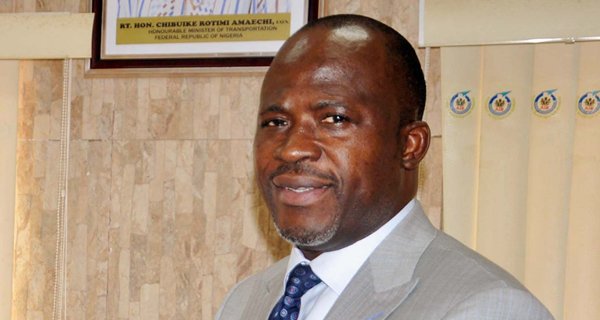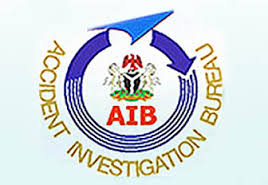AIB trains investigators on use of drones for accident investigation

Photo Caption :
From left, Managing Director, UNILAG Consult, UNILAG, Akoka, Lagos, Prof. Adebayo Otitoloju, Commissioner/Chief Executive, Accident Investigation Bureau, (AIB) Capt. Akin Olateru, C.E.O., Unmanned Flight Operations Aviation services Ltd., Mr. Omitola Adelana and Head of Training, Unmanned Flight Operations Aviation services Ltd, Capt. Sunny Adegbuyi at the closing ceremony of two week training of Accident Investigation Bureau, (AIB) on flight drones held at UNILAG Consult, UNILAG, Akoka, Lagos.
Accident Investigation Bureau Nigeria (AIB-N) has trained 10 investigators on the use of Unmanned Aerial Vehicle (UAV) popularly referred to as drone in a bid to ensure data accuracy and enhancement of accident investigation by the agency.
Speaking on Thursday at the closing ceremony of the weeklong Remotely Piloted Aircraft Systems (RPAS) training for investigators, held at University of Lagos (UNILAG) Consult, in Lagos, the commissioner of AIB, Engr. Akin Olateru said that the agency would not relent on its efforts a bid to enhance human capacity building, not just for the industry, but for the country at large.
Olateru explained that in 2019 alone, AIB trained its investigators in the United Kingdom, United States and several other countries around the world and vowed that the management would continue to invest in human capacity in order to increase the safety of the airspace.
Olateru noted that the current management since it came on-board a few years ago, had raised the profile of AIB from a sleeping agency to a more vibrant one, noting that management had also improved the equipment, infrastructure, training and welfare for staff, while it had a new Condition of Service (CoS) approved for its staff.
Olateru hinted that the training was the Nigerian Civil Aviation Authority (NCAA) approved RPAS training according to the advisory circular GAD-AC-002B, which has been formed in line with the International Civil Aviation Organisation (ICAO) RPAS Operations Document 10019, Section 8.4.31 internationally and the NCAA General advisory GAD-AC-002 Section 4.7/ Appendix E29 locally.
He said the document was currently under extensive review by NCAA.
Olateru emphasised that drone technology had become very critical to modern aircraft accident Investigation, which benefits included first responder capability, on-time post-crash site preservation capability, gathering, preservation and analysis of crash site evidence, 3D modelling capability and accurate and complete wreckage diagram through site mapping capability.
He said: “Adapting to the latest trends and technologies in accident investigation ensures that our facilities and reports are rated highly all over the world. To ensure that these trends and technologies are effectively and efficiently utilised, our staff need to be regularly trained and retrained.
“At AIB, we believe in investing in our human capital so that they can be able to put in their best in the delivery of their various duties. To make any organisation a success story, human capital remains the greatest asset and you must invest in it. It is important to continuously train and equip the staff, give them support and they must trust you as management for them to be able to deliver on their mandate.
“So far, this ideology has worked greatly for AIB. We now publish our final reports timely, thanks to our adaptation of the latest trends and technologies and rigorous training of our human capital.”
The AIB helmsman declared that deployment of the technology was important to the investigation process, stressing that mishap could occur anywhere.
He maintained the equipment could also help its investigators to capture the whole site from the initial impact point to the wreckage’s final resting location.
“The ground marks and wreckage distribution help to identify how the aircraft hit the ground. Aerial images are also useful for showing the relative positions of obstacles, such as trees or buildings, that may have been struck before ground impact.
“They help to reveal the surrounding terrain and environment that the pilot faced if there was an attempted forced landing. And when it’s a large aircraft at an accident site, aerial images help to document the damage to its upper surfaces,” he said.
He equally lauded UFO Aerial Services for training the AIB staff on the use of the equipment and appealed to the trainees to put the knowledge garnered at the training to proper use in order to encourage others.
Also, Mr. Damilola Adelala, the chief executive officer (CEO) of UFO Aerials Services, extolled the commitment of the trainees, saying they behaved professionally throughout the duration of the course.
He explained that the training acquired during the period would help them to improve their technological-know-how about the job and data gathering.
Besides, Prof. Adebayo Otitoloju, the managing director of UNILAG Consult, expressed joy that the consult could partner with AIB to conduct the training for its investigators.

















AVSEC: FAAN graduates 381 cadets, instructors
BASL warns against criminal acts at MMA2 Terminal, says offenders will not go unpunished.
Inside Sources Reveal True Situation at Polaris Bank Limited, Clarify Falsehood and Media Attacks against Bank
Facebook partners Jumia on ‘Boost Your Business’ initiative